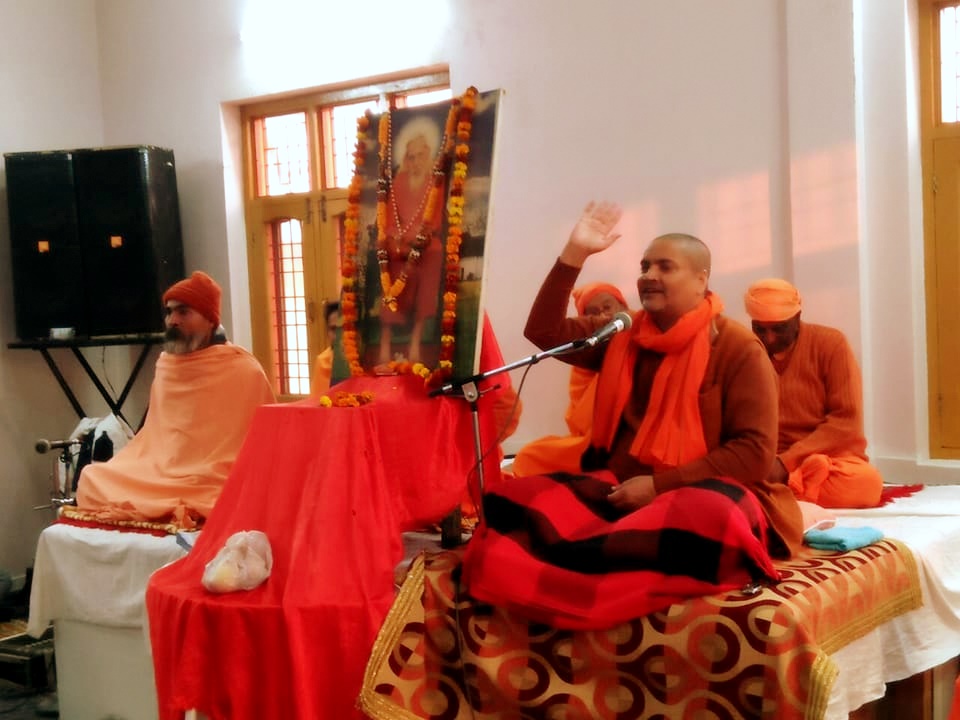Path of the Masters: Sant Mat - Santmat, Radhasoami - Radha Soami, Satsang, Inner Light and Sound Meditation: Surat Shabd Yoga, Audible Life Stream, Quan Yin Method, Spiritual Science, Spirituality, Kabir, Maharshi Mehi, Kirpal Singh, Gnosticism, Third Eye, Out Of Body Experiences, Near-Death Experiences, Inner Space, the Kingdom of the Heavens Within, Mystic Poetry, Vegetarian Vegan, Ahimsa, Love, and God. The term "Sant Mat" was coined by Sant Tulsi Sahib of Hathras during the 19th Century.
Showing posts with label books from india. Show all posts
Showing posts with label books from india. Show all posts
Friday, January 26, 2018
Staying on the Path: The Three Levels of Satsang -- Light and Sound on the Path
"We should all seek Truth for the sake of Truth.
“They who reflect, who reflect upon You,
Lightning flashed in my eye, O friend,
* The ARCHIVE of all past posts/articles/blogs is located here, and includes a search engine:
* For Daily Spiritual Quotes/Quote of the Day @ Facebook, See the Sant Mat Radhasoami Page:
* YOUTUBE ARCHIVE OF PODCASTS (New Programs Are Added Each Week):
Mystic Poetry of Sant Maharshi Mehi (Padavali, Hymns Sung in Satsang) -- Spiritual Awakening Radio
1/30/2018 (Upcoming) Prem Updesh Radhasoami of Huzur Maharaj
1/30/2018: Prem Updesh Radhasoami of Huzur Maharaj;
2/6/2018: An Introduction to Sant Mat, The Path of the Masters;
2/13/2018: An Introduction to Radhasoami, The Path of the Masters;
2/20/2018: An Introduction to Inner Light and Sound Meditation (Surat Shabd Yoga);
2/27/2018: The Yoga of LIGHT -- Inner Light Meditation;
"The soul is pure and therefore by nature still. Due to its stillness, the soul is eternal. Therefore, Lord Krishna advises that the mind should be connected to the soul. Self-realization is the objective and the goal of all human life. But where can we obtain this goal? The answer is within one’s heart. This is not the physical heart, but rather the heart of the inner Self. This is called, by the Sants, the yoga heart (innermost Self). It is in this space that the mind is linked to the soul. The Sants have described this place with many names such as: the “sky portal,” the “tenth gate,” “the point,” “window,” the “lotus flower,” “sushumna,” “ajna chakra,” “third eye,” “center of the eyebrows,” “tip of the nose,” “bindu,” etc..."
"ya nisha sarva-bhutanam tasyam jagarti samyami
"That which is day to the many is night to the sage,
O traveller! Seek the path that lies within you,
Friday, April 22, 2011
Happy Earth Day 2011!
Happy Earth Day 2011!
We Are All In This Together
The vegan revolution will never include violence; it is a celebration of the joy and beauty of life, and an awakening to the beauty and potential of our shared life on this planet. The only strategy for each of us is how to love and give more deeply, fully, and authentically, and in harmony with our unique talents and gifts. Together, we are transforming our world! (Dr. Will Tuttle)
Why Hindus Don't Eat Meat
(Excerpts from, Hinduism Today)
By Dr. Jai Maharaj
Vegetarianism is the key to good health and happiness. The Hindu view is multi-dimensional, including the ecological, medical and spiritual, as is evident in the following excerpts from Hinduism Today:
Besides being an expression of compassion for animals, vegetarianism is followed for ecological and health rationales.
Reasons
In the past fifty years, millions of meat-eaters -- Hindus and non-Hindus -- have made the personal decision to stop eating the flesh of other creatures. There are five major motivations for such a decision:
1. The Dharmic Law Reason
Ahinsa, the law of non-injury, is the Hindu's first duty in fulfilling religious obligations to God and God's creation as defined by Vedic scripture.
2. The Karmic Consequences Reason
All of our actions, including our choice of food, have Karmic consequences. By involving oneself in the cycle of inflicting injury, pain and death, even indirectly by eating other creatures, one must in the future experience in equal measure the suffering caused.
3. The Spiritual Reason
Food is the source of the body's chemistry, and what we ingest affects our consciousness, emotions and experiential patterns. If one wants to live in higher consciousness, in peace and happiness and love for all creatures, then he cannot eat meat, fish, shellfish, fowl or eggs. By ingesting the grosser chemistries of animal foods, one introduces into the body and mind anger, jealousy, anxiety, suspicion and a terrible fear of death, all of which are locked into the the flesh of the butchered creatures. For these reasons, vegetarians live in higher consciousness and meat-eaters abide in lower consciousness.
4. The Health Reasons
Medical studies prove that a vegetarian diet is easier to digest, provides a wider ranger of nutrients and imposes fewer burdens and impurities on the body. Vegetarians are less susceptible to all the major diseases that afflict contemporary humanity, and thus live longer, healthier, more productive lives. They have fewer physical complaints, less frequent visits to the doctor, fewer dental problems and smaller medical bills. Their immune system is stronger, their bodies are purer, more refined and skin more beautiful.
5. The Ecological Reason
Planet Earth is suffering. In large measure, the escalating loss of species, destruction of ancient rainforests to create pasture lands for live stock, loss of top-soils and the consequent increase of water impurities and air pollution have all been traced to the single fact of meat in the human diet. No decision that we can make as individuals or as a race can have such a dramatic effect on the improvement of our planetary ecology as the decision not to eat meat.
History
The book Food for the Spirit, Vegetarianism and the World Religions, observes, "Despite popular knowledge of meat-eating's adverse effects, the non-vegetarian diet became increasingly widespread among the Hindus after the two major invasions by foreign powers, first the Muslims and later the British. With them came the desire to be 'civilized,' to eat as did the Saheeb. Those actually trained in Vedic knowledge, however, never adopted a meat-oriented diet, and the pious Hindu still observes vegetarian principles as a matter of religious duty.
"That vegetarianism has always been widespread in India is clear from the earliest Vedic texts. This was observed by the ancient traveler Megasthenes and also by Fa-Hsien, a Chinese Buddhist monk who, in the fifth century, travelled to India in order to obtain authentic copies of the scriptures.
"These scriptures unambiguously support the meatless way of life. In the Mahabharata, for instance, the great warrior Bheeshm explains to Yuddhishtira, eldest of the Paandav princes, that the meat of animals is like the flesh of one's own son. Similarly, the Manusmriti declares that one should 'refrain from eating all kinds of meat,' for such eating involves killing and and leads to Karmic bondage (Bandh) [5.49]. Elsewhere in the Vedic literature, the last of the great Vedic kings, Maharaja Parikshit, is quoted as saying that 'only the animal-killer cannot relish the message of the Absolute Truth [Shrimad Bhagvatam 10.1.4].'"
Scripture
He who desires to augment his own flesh by eating the flesh of other creatures lives in misery in whatever species he may take his birth. Mahabharat 115.47
Those high-souled persons who desire beauty, faultlessness of limbs, long life, understanding, mental and physical strength and memory should abstain from acts of injury. Mahabharat 18.115.8
The very name of cow is Aghnya ["not to be killed"], indicating that they should never be slaughtered. Who, then could slay them? Surely, one who kills a cow or a bull commits a heinous crime. Mahabharat Shantiparv 262.47
The purchaser of flesh performs Hinsa (violence) by his wealth; he who eats flesh does so by enjoying its taste; the killer does Hinsa by actually tying and killing the animal. Thus, there are three forms of killing: he who brings flesh or sends for it, he who cuts off the limbs of an animal, and he who purchases, sells or cooks flesh and eats it -- all of these are to be considered meat-eaters. Mahabharat Anu 115.40
He who sees that the Lord of all is ever the same in all that is -- immortal in the field of mortality -- he sees the truth. And when a man sees that the God in himself is the same God in all that is, he hurts not himself by hurting others. Then he goes, indeed, to the highest path. Bhagavad Geeta 13.27-28
Ahinsa/ahimsa is the highest Dharma. Ahinsa is the best Tapas. Ahinsa is the greatest gift. Ahinsa is the highest self-control. Ahinsa is the highest sacrifice. Ahinsa is the highest power. Ahinsa is the highest friend. Ahinsa is the highest truth. Ahinsa is the highest teaching. Mahabharata 18.116.37-41
What is the good way? It is the path that reflects on how it may avoid killing any creature. Tirukural 324
All that lives will press palms together in prayerful adoration of those who refuse to slaughter and savor meat. Tirukural260
What is virtuous conduct? It is never destroying life, for killing leads to every other sin. Tirukural 312, 321
Goodness is never one with the minds of these two: one who wields a weapon and one who feasts on a creature's flesh. Tirukural 253
Tags: veg, compassion, ahimsa, health, climate change, diet, global warming, save the planet, vegan, vegetarian, go green, be veg go green 2 save the planet, hindu, hinduism, india,
Sunday, December 19, 2010
Sant Mat Satsang, Weekly Stream of Updates: Light and Sound on the Path, Dec. 19th
Sant Mat Satsang, Weekly Stream of Updates: Light and Sound on the Path, Dec. 19th:
Rumi: "Love is the energizing elixir of the universe, the cause and effect of all Harmonies."
"In all truth it can be said that the fall of the human being took place when he began to forget himself. That is to say: to forget his Supreme Being, the mysterious Source whence he emerged." (The Law of Attention - Nada Yoga and the Way of Inner Vigilance, Edward Salim Michael, Inner Traditions)
Yeshua: "If your spiritual guides say to you, 'Look, the divine realm is in the sky,' well then the birds will get there ahead of you. If they say, 'It is in the sea,' then the fish will precede you. No, the divine Reality exists inside and all around you. Only when you have come to know your true Self will you be fully known - realizing at last that you are a child of the Living One. If, however, you never come to know who you really are, you are a poverty-stricken being, and it is your 'self' which lies impoverished." (Gospel of Thomas - Wisdom of the Twin, Lynn Bauman, White Cloud Press)
"O Surat [Soul]! Who are you and whence have you come? This world is a net spread by the mind. Why do you get entangled in it? You are a ray from the Purush (the Supreme Being) and an inhabitant of the purely Spiritual Region. Kal [lord of time] has put a noose round your neck. Turn back and go to your Home, by the grace of Sat Guru and in the company of Sadhs (those who are engaged in Parmath [spirituality]). Listen to Anhad Shabd within, says Radhasoami." (Swami Ji Maharaj, Sar Bachan Poetry, Volume One)
Youtube: The Audible Life Stream - Ancient Secret of Dying While Living:
Kabir says: "Keep on doing your work. Keep on reciting God's name, and you will live pleasantly in the world."
Guru Nanak: "With the holy Name as one's foundation, this wavering mind is firmly held, and in Truth it dwells. And when in truth one love's the Lord, then the Lord Himself grants union with Him."
More satsang MP3s have been added to the Anurag Sagar Page ("Center For Anurag Sagar Studies") along with some other updates:
Recommended Reading: New PDF E Book Online: Param Sant Tulsi Sahib of Hathras, translated into English by S. D. Maheshwari, containing: A Short Biographical Sketch about Tulsi Sahib, a large collection of Shabds: mystical Hymns from his Shabdavali, and excerpts from the Ghat Ramayan (Dialogue Between Tulsi Sahib and Phool Das of the Kabir Panth, with commentary on the Anurag Sagar, and contains some hymns of Tulsi Sahib, Kabir, Dadu, Dariya Sahib, Guru Nanak, Mirabai, and Soor Das). This collection of Tulsi Sahib writings was originally published in the Hindi edition of, Prem Patra Radhasoami, Volume Six, by Huzur Maharaj of Agra:
Kabir says, "It is the mercy of my Satguru that has made me to know the unknown. I have learned from Him how to walk without feet, to see without eyes, to hear without ears, to drink without mouth, to fly without wings. I have brought my love and my meditation into the land where there is no sun and moon, nor day and night. Without eating, I have tasted of the sweetness of nectar; and without water, I have quenched my thirst. Where there is the response of delight, there is the fullness of joy. Before whom can that joy be uttered? Kabir says: "The Guru is great beyond words, and great is the good fortune of the disciple." (Songs of Kabir, satgur soi daya kar dinha)
Rumi: "O lovers, lovers it is time to set out from the world. I hear a drum in my soul's ear coming from the depths of the stars."
Rumi Says: "Do not be satisfied with the stories that come before you. Unfold your own myth."
Soami Ji Maharaj, Sar Bachan Poetry: "Practise the Abhyas of Surat Shabd Yoga. Apply your body and mind to Sumiran (recitation of the Holy Name). Go on beholding the countenance of Guru. Listen to the Sound of Anhad Shabd every day. Cultivate a keen desire to attend Satsang, and do so whenever you can."
"The deeper one goes in meditation, and the loftier the spiritual states one touches, the more the motion and feeling of time will alter and take on an entirely different aspect. The greater the merger into one's higher state of consciousness, the slower and less perceptible will time become until, in the still more exalted mystical states, it will feel as if it stops altogether." (Edward Salim Michael, "The Law of Attraction - Nada Yoga and the Way of Inner Vigilance", Inner Traditions, Vermont)
Soami Ji Maharaj, Sar Bachan Poetry: "The devotee should sit in a secluded place, turn his senses inward and perform Abhyas [meditation practices]. He will attain peace of mind. He should withdraw the two petals (the currents flowing to the two eyes from the focus), and advance to Gagan [mystic inner Sky]. He will hear Shabd and feel delighted. He will behold Jyoti flame (in Sahas-dal-kanwal), the Sun (in Trikuti), and the Moon (in Sunn). He will reach Sat Lok and settle there. On hearing the incessant resounding of Shabd, his Surat will smile in ecstasy and bliss."
"O devotee! There is a wonderful display within this body. In the darkness of this body is the sky studded with the stars, the Moon and the Sun. There is the subtle body within the physical one and in that subtle body is the causal one. And yet there is the fourth one, that is, the supra-causal body. The fifth body, that is, Kaivalya (Oneness) is without attributes and full of knowledge. Mehi says, the Quintessential Word along with the Absolute, is present within one's body." (Padavali of Maharshi Mehi)
"Whatever a seeker's higher destiny is, and whatever direction his Supreme Being bids him take to accomplish it, he must obey and not let himself be swayed by the persuasive arguments or criticism of others, no matter how logical their reasoning may appear or how harsh their condemnation may be." (Edward Salim Michael, "The Law of Attraction - Nada Yoga and the Way of Inner Vigilance", Inner Traditions, Vermont)
"Those, within whom the Truth dwells, obtain the True Name; they speak only the Truth. They walk on the Lord's Path, and inspire others to walk on the Lord's Path as well." (Guru Ramdas)
"True scriptures are those which teach kindness and compassion towards all living beings." (Nigam soi jo daya dridhave.) -- Sant Dariya Sahib
"This mysterious path is described in the holy books, but it cannot be found simply by the study of sacred texts. It is found by the grace and guidance of an accomplished teacher." (Swami Sant Sevi Ji Maharaj)
Subscribe to:
Posts (Atom)













